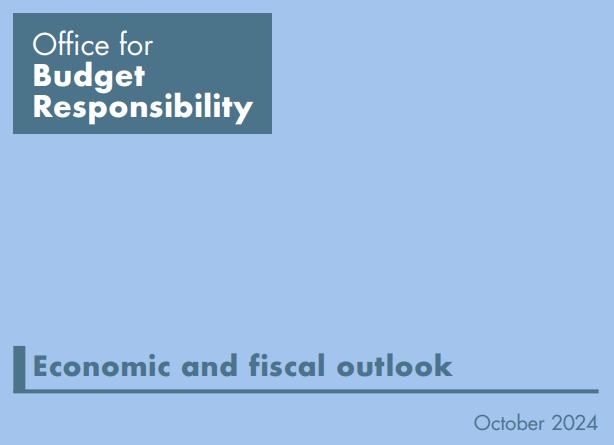30 October 2024

Budget delivers large increases in spending, tax, and borrowing
The Budget increases spending by £70 billion annually, with two-thirds on current and one-third on capital spending. Half is funded through tax increases which raise £36 billion annually and push the tax take to a record 38 per cent of GDP. The rest is funded by £32 billion more borrowing annually which temporarily boosts GDP growth to 2 per cent in 2026, but leaves output unchanged in the medium term. New fiscal rules, to balance the current budget and get net financial liabilities falling relative to GDP in five years, are met by small margins of £10 and 16 billion respectively.
Against a largely unchanged economic and fiscal backdrop, today's Budget delivers a large, sustained increase in spending, tax, and borrowing; a temporary boost to the economy; and a new set of fiscal rules.
Here are five things you need to know:
- The new Government's Budget increases spending by £70 billion per year over the next five years. Two-thirds of this goes on day-to-day spending, while one-third goes on investment. This means the size of the state as a share of the economy now settles at 44 per cent by the end of the decade - 5 percentage points higher than before the pandemic.
- Just over half of this is funded by an increase in taxes, which raise £36 billion a year in extra revenue, most of which comes from an increase in employer National Insurance contributions. These and other tax changes take the overall tax burden to 38 per cent by the end of the decade - its highest level on record.
- The other half of the increase in spending is funded through extra borrowing, which means that total government borrowing falls more slowly, and is around one per cent of GDP or £32 billion higher a year over the forecast.
- The extra government borrowing delivers a temporary boost to the economy with real GDP growth rising from 1.1 per cent this year to 2 per cent next year. But Budget policies leave the level of output largely unchanged in the final year of the OBR's forecast.
- To make room for this extra borrowing, the Government also sets itself two new fiscal rules over the next five years:
- The first one is to balance the current budget, or the difference between day-to-day spending and revenues - which it meets by a margin of £10 billion.
- The second one is to get its net financial liabilities, or the difference between its debts and its financial assets, falling as a share of GDP - which it meets by a margin of £16 billion.
Source: Office for Budget Responsibility, www.obr.uk
You can find out more in the OBR's October 2024 Economic and fiscal outlook on the link below:
Downloads WIDE-FORMAT FORECAST FOR PRINTING
WIDE-FORMAT FORECAST FOR PRINTING
8 January 2025
Keypoint Intelligence Forecast Conveys Growth Patterns, Technology Shifts, and Market Opportunities in the Wide Format Industry.
 Simpler Recycling Requirements in England
Simpler Recycling Requirements in England
21 January 2025
In order to increase recycling rates the government has introduced measures to simplify workplace recycling in England.











